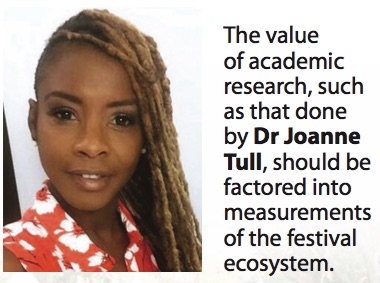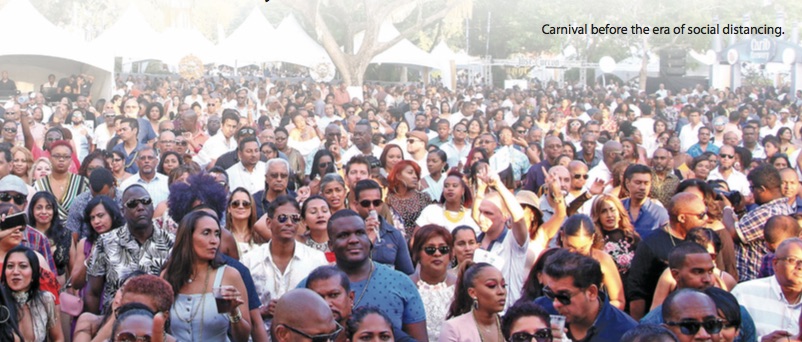
It’s a monthly online national conversation, moderated by Denise Demming and, on March 4, the focus was on the economics of A Taste of Carnival, the National Carnival Commission’s offering for 2022.
The main presenter was Dr Jo-anne Tull, a lecturer in cultural industries development and management at The UWI. Dr Tull explored the intersections between economics and culture—a largely neglected area of research—and used Carnival as an example.
Her central premise was that the idea of Carnival as primarily an experience must be re-evaluated in the context of economics “if we are giving contemplation to trade and export, and if we are serious about sustainable development.”
Traditionally, she said, that notion of a “fleeting experience” is the way Carnival has been conceptualised. It is not a surprising interpretation given the approach to its staging and management over the years. Wendell Manwarren, an artist, producer, and educator, and one of the panellists at the discussion, provided a useful breakdown of how this functions when he noted that, during the season, people get locked into their particular interests almost to the exclusion of everything else. Wirebenders bend, pannists steel themselves, masmakers sew, glue and construct costumes, calypsonians compose, soca and chutney performers get into their grooves, and fete promoters market and coordinate their events. It is an enormous range of activities, covering a wide expanse of economic ventures that remain lodged inside silos. Everyone’s interaction with the overall event is filtered through their individual niches.
For Dr Tull, all of these seemingly disparate acts are part of the Carnival ecosystem. It is a way of seeing that will enable “holistic conceptualisation, planning, development and analysis.”
“Measuring it as an experience limits both the concept and the scope of what the Carnival means, as if it were only about a moment, as if it were confined only to its immediate stakeholder groups, and because of that, its broader impacts tend to be overlooked,” she said. “That is why they were able to come up with the term, A Taste of Carnival.”
She defined festival economics as a way to capture, measure and assess data derived from the activities, processes and stakeholders within a cultural ecosystem that features performances, participation and practices such as a Carnival ecosystem.
If the focus remains on the aspect of experience, it is unwieldy to assess but, girded on an ecosystem, it provides different tools and forces us to recognise components that are often ignored.
“Measuring is knowing,” Dr Tull said. It is at the core of everything she has done in her Carnival studies research over more than a decade. Too many elements fall outside the usual parameters of evaluation, and this stymies overall development. She wants to see policy shifts as a result of research based on the festival economics she advocates passionately.
“We don’t know the level of investment by communities,” she said, especially those associated with the responsibility for traditional mas forms. We don’t know the internal expenditures from other communities. We have not even thought to measure such things as the increase in purchases of SIM cards or car rentals by visitors. She revealed that, for many tourists, it is common for their individual spend to be around US$14,000 for a visit during the season.

The usual approach to planning is to focus on festival programming and marketing, to offer an experience. The data captured from this is woefully inadequate for planning because it is confined to only one segment of the ecosystem.
The global pandemic has forced participants at all levels to rethink their strategic approaches to the festival. It is an encouraging sign of the capacity to adapt to change. The dependence on state agencies, such as the National Carnival Commission, for direction and permissions was cast aside as creatives and others saw their financial survival threatened. Manwarren said that, for him and his 3Canal team, it was a matter of evaluating the health and safety conditions before going ahead with their plans.
Dr Tull proposed that the focus should be shifted to the entire ecosystem: creatives and creative entrepreneurs; creative communities and their activities; Carnival experience-related and supporting industries and enterprises; facilitative infrastructure; education (such as the Carnival studies at The UWI’s DCFA, and broader aspects taught at secondary schools), research and development platforms; security; health; statutory bodies and of course, the ultimate goal of shifting policies to provide a more relevant form of preserving and protecting various aspects of the cultural heritage of the region.
Dr Tull’s work has not been confined to studying the Trinidad and Tobago experience. She has served as a consultant throughout the Caribbean, and has been able to assess the similarities and differences in each environment. The data-gathering she advocates would benefit all of the carnivals as it would increase the capacity to provide complementary festivals that can still maintain individual characteristics.
Based on his experiences at several global carnivals (150 such in the world!), Manwarren believed that visitors come to partake of local fare, not to have versions adapted for foreign tastes. There is a creature known as a Carnival tourist, someone whose pleasure is found in globe-trotting to sample exotic festivals (like a cricket tourist). It might mean some level of accommodation, but not an abandonment of the cultural heritage that we have to preserve and honour even as we seek to create a viable industry out of it.
Dr Roger Hosein was astonished at the figure of US$14,000 as an individual expenditure that he jumped in to declare his regret that he had not been able to pursue research into this realm.
Others shared their perspectives as well: Camille Parsons, CEO at Advanced Dynamics Ltd, on the challenges with new digital approaches, like streaming. Robert Amar, with a stridently business approach, and Prof Anthony Gonzales, who asked about the distribution of gains. The discussions served to accentuate how many more are needed.
Dr Tull’s concept of recalibrating research to measure an ecosystem rather than an experience was a compelling one that deserves to be embraced and supported. She ended by hinting that, with all the unknowns surrounding the financial revenues of the existing industry, we might be surprised to see how favourably it compares with oil and gas.
